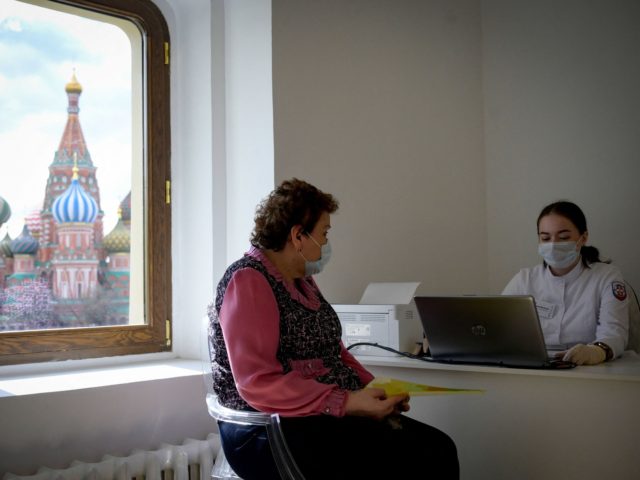SuperJob.ru, a Russian jobs portal similar to LinkedIn, published a survey on Sunday that found 42 percent of Russians are unwilling to be vaccinated against the Wuhan coronavirus under any circumstances, while another 20 percent said they found it difficult to decide if they should be inoculated.
The poll found that only 18 percent of Russians said they would definitely get vaccinated, and another 20 percent said they would get shots if they planned to travel abroad. The Moscow Times noted that Greece announced last week that vaccinated Russian tourists would be welcomed.
“While Russia has heavily touted Sputnik V as the world’s first approved coronavirus vaccine and it has been authorized for use in over 60 countries worldwide, the jab – along with Russia’s two other approved vaccines – have been met with cool reception at home. At its current pace, Russia is on track to vaccinate 70% of its population by February 2023,” the Moscow Times reported.
The other two coronavirus vaccines approved for use in Russia are CoviVac, a product of the Chumakov Federal Scientific Center for Research and Development of Immune and Biological Products of the Russian Academy of Sciences, and EpiVacCorona, developed by the Vector Institute of Novosibirsk, Siberia.
Russian officials claim EpiVacCorona, the newest of the three, is 100 percent effective based on clinical trials. Sputnik V, the primary Russian vaccine, is allegedly 92 percent effective, although these claims have been disputed by other countries that studied Sputnik V and questioned the methodology of its clinical trials.
Russia angrily demanded the return of 200,000 doses of Sputnik V from Slovakia in April after Slovakia’s State Institute for Drug Control questioned the safety and effectiveness of the vaccine and criticized Russian officials for withholding too much of the data needed to fully evaluate it.
Russian Presleaderident Vladimir Putin claims to have been fully inoculated, but the normally publicity-hungry despot received his shots behind closed doors and refused to specify which vaccine was used.
Putin’s coyness has done little to reassure Russians worried about the safety and efficiency of the vaccines. As the Moscow Times pointed out, several other surveys have reported roughly comparable levels of resistance to vaccination as the new SuperJob poll. Chronic supply shortages dampened enthusiasm, as did the Russian government’s tendency to downplay the number of coronavirus cases and casualties, so it can claim the pandemic is fully under control.
“Many people say, ‘why should I get a vaccine if the state doesn’t force me to?” analyst Denis Volkov of the independent Levada Center said in late April after his organization found two-thirds of Russians were unwilling to get vaccinated.
The Russian government insists these polls are incorrect and vaccination rates are improving. At the end of April, only a little over 12 million Russians had received at least one shot, and only 7.7 million were fully vaccinated, representing about 5 percent of the population.
Moscow began offering thousand-ruble coupon books as an incentive for vaccination (worth about $13 U.S., a significant value for impoverished Russian pensioners), while some regions went as high as 2,000 rubles, but there was little positive impact on vaccination rates. Russia would have to double its rate to hit the government’s herd-immunity targets for the summer.

COMMENTS
Please let us know if you're having issues with commenting.